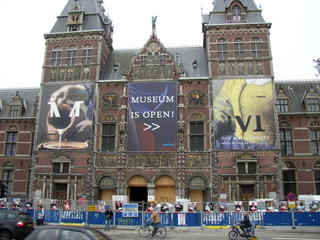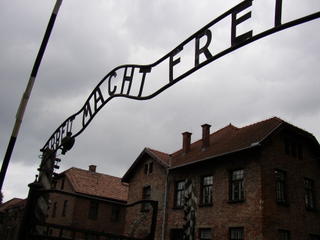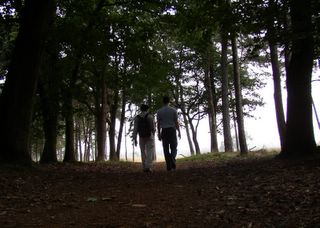Josh Carson was a good guy. Everyone at the office thought so. Not that there was anything especially noteworthy about him -- just another junior account manager in just another cubicle at the Van Jaren Corporation. Yet he was a hard worker, a kind person, and a good listener. The kind of guy that would bring fresh bagels and donuts to the break room every Friday for everyone to share. The kind of guy who was dependable and trustworthy, even when it came to covering for other people's shortcomings. And, as it just so happened, Josh was a fantastic storyteller -- popular for his stories and jokes that always seemed to make a lunch break go by quickly.
One day over lunch, a particularly large crowd had assembled around Josh as he sat in the back corner of the break room, by the water cooler. The previous day, Josh had handled another high-stress phone call from a notoriously difficult purchaser at Bale Inc. (Van Jaren Corp's biggest client), and he was entertaining the assembled masses with an anecdotal recount of the events. As it so happened, everyone in the break room was so absorbed with Josh's story that they failed to notice the auspicious entrance of none other than Willem van Jaren himself -- founder, CEO, and president of the Van Jaren Corporation -- accompanied by two of the company's top vice presidents. It was only when Mr. van Jaren interrupted Josh's story that everyone noticed the shocking presence of the company figurehead (to this day, the number of occasions in which Mr. van Jaren could be seen mingling with the middle management in the break room can be counted on one hand). And when the room's attention fell upon Mr. van Jaren, open mouths dropped a notch further to see him place his hand on the shoulder of Josh Carson and request his immediate accompaniment to the conference room. It turned out that the Van Jaren board of directors were currently in a meeting with the CEO of mighty Bale Inc., regarding a "serious contract dispute" -- and Josh's "expertise" was needed at once. Obviously, this must have been an unusual situation, to have waranteed the personal appearance of Mr. van Jaren himself. But no further explanation was given; so Josh went with him.
The crowd of office workers spilled out of the break room and into the hallways, past the forest of pre-fabricated cubicles in the direction of the executive wing of the office. No one wanted to miss what was about to happen. People were practically stumbling over each other to get a front-row seat to the spectacle. And in all the hubub, the crowd once again almost failed to notice the addition of an unexpected guest -- this time, a short, balding Middle-eastern man in blue coveralls, quite out of place among the crowd of suits and white collars. In fact, this man was a mainstay at the Van Jaren Corporation, having faithfully served as a part of the janitorial staff at the Van Jaren Corporation for twelve years. But no one knew his name. He was generally recognized by the people at the office -- but only in casual encounters (which were generally avoided) and water cooler gossip regarding suspicions of al-Quaida connections (as if every Iranian immigrant happens to be a card-carrying member of an underground terrorist cell). Of course, it was unusual for the office staff to interact with the janitorial crew; yet it was equally strange for a blue-collar to seek the attention of the white-collars (unless it was pay day). Those working on cleaning and maintenance generally understood that they were to keep out of the way of those working on bookkeeping and account management... but on this day, the janitors were facing a maintenance emergency -- an overflowing toilet, in the front lobby facilities, to be precise. As the janitor had been observing Josh for quite some time, he had noticed that the junior account manager was a kind person with a heart to help people. Thus, as Mr. van Jaren escorted Josh through the office catacombs and past the richly decorated front lobby, the Iranian janitor in blue coveralls skipped protocol in the midst of his crisis, thinking to himself, "If I can just get his attention, perhaps he can help." Quietly but confidently, he reached out his grimy calloused finger and tapped Josh on the shoulder, almost as if he hoped that he wouldn't be noticed as the crowd passed by.
In that instant, as the executives marched toward the executive wing with the middle management yipping at their heels like a pack of beagles, Josh stopped. He turned around in the crowd and asked, "Did someone just tap my shoulder?"
"Oh come on, Carson! You can't be serious!" exclaimed John, head of the sales department. "We're all practically stumbling over you -- so how could you possibly ask something so stupid like 'Did someone just tap my shoulder?'"
But Josh kept looking around to see who had done it. Then the poor Iranian janitor spoke up, trembling with fear, and explained his situation -- words tumbling out in a sort of spontaneous confessional about the backed-up toilet, the rush of water and sewage over the marble floors, the visiting salesmen loudly berating the poor janitor as he stumbled for the keys to the supply closet... Josh listened attentively, trying to size up the situation, and decided to quickly take action, reassuring the janitor "Don't worry, sir. I think I can help." With a general-issue plunger, a limited knowledge of plumbing basics, and a look of confident determination, Josh marched through the mess into the men's room off the front lobby. Nobody saw exactly how he did it, but soon the stupified spectators heard a satisfying flush and Josh emerged from the restroom with a smile. He handed the plunger back to the janitor, shook his hand warmly, and said, "I'm glad that I could be of assistance, sir."
Unfortunately, in this moment, a stodgy group of suits from Bale Inc. stormed past the scene with anger in their eyes and determination in their step. One of the Van Jaren Corporation's senior vice presidents was trailing the Bale Inc. delegation as they marched toward the lobby, trying to get a word in with the angry businessmen, but the spokesman of the Bale delegation practically shouted behind him: "Don't even bother!" The infuriated suits somehow managed to march across the slippery marble in the lobby, but as the elevator doors closed on their hawk-like faces, the spokesman yelled out the classic parting shot -- "We'll see you in court!"
Mr. van Jaren's face fell, and he started to walk away with a poorly-fiegned sense of pride and indignation. Yet almost as if the preceding dialogue hadn't just unfolded in front of them, Josh offered words of reassurance: "Don't worry, sir. I think I can help."
While most of the office crowd stood in shock and disarray, Josh redirected his attention toward the executive wing's conference room with a look of confident determination, accompanied only by Mr. van Jaren, the vice presidents, and a couple of the other junior account managers who worked with Josh on the Bale Inc. acount. When they reached the conference room, several of the company directors were in tears; some of the secretaries had even begun to pack up their desks, as if in preparation for an immediate freeze on all company assets. But Josh went into the oak-paneled conference room and calmly suggested, "It's probably just a little misunderstanding. Let's just take a look at things..."
If nothing else, this statement appeared to have the effect of comic relief, as the dejected executives laughed at the presumed naïveté of this lowly junior account manager. But Josh cleared conference room of all the caterers and secretaries and legal advisors. He instructed Mr. van Jaren and the senior vice presidents to sit down in the high-backed leather chairs on one side of the table, as he and his co-workers sat down on the other side of the table to examine the Bale Inc. dossier. After just a brief moment of examining the files, Josh looked up with a smile and pressed the call button to the front receptionist. "Tina, could you please call Mr. Bale on his mobile phone right away?" he calmly requested. "Tell him to look at line fourteen, on page two of appendix D. He can have his accountants recalculate the figures based on this rate, and if he has any further questions he can give us a call." The executives sitting across the conference table were completely astonished, but besides themselves with glee -- realizing that Josh had just, in effect, saved the company.
Josh laid the files back on the table and stood up to leave. Mr. van Jaren leaned across the table to shake his hand, which Josh received warmly. But he said, "There's no need to make a big deal of this, sir. I'm just glad that I could be of assistance."
[
Special thanks to JR, Todd, Michaël, and Mark for their contributions to this story]









